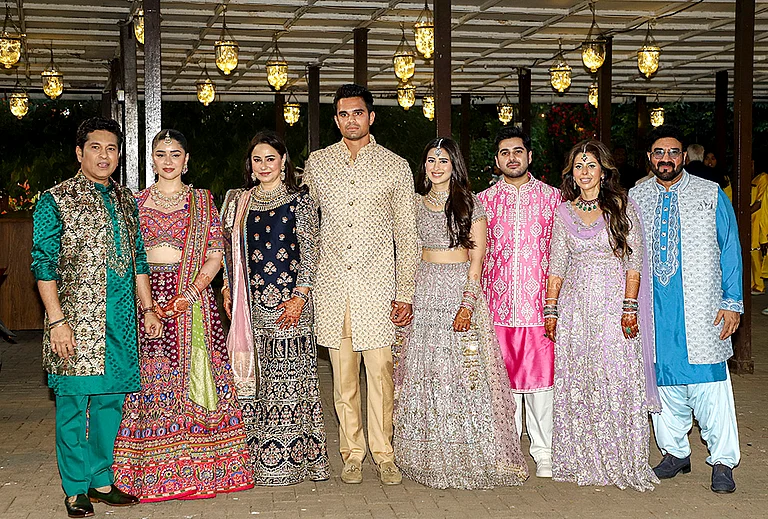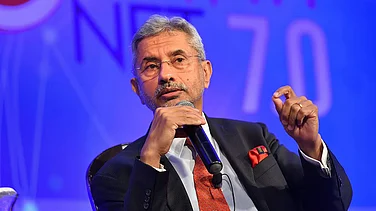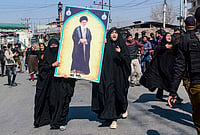The debate surrounding the wearing of hijab by Muslim students is yet to see any resolution with the Supreme Court on Thursday delivering a split verdict on the hijab ban in Karnataka education institutions. While one judge held that permitting a community to wear its religious symbols will be an "antithesis to secularism", the other insisted that wearing the Muslim headscarf should be simply a "matter of choice".
What is the split judgment on Hijab ban?
On March 15, the Karnataka High Court had dismissed the petitions filed by a section of Muslim students of the Government Pre-University Girls College in Karnataka's Udupi seeking permission to wear the hijab inside classrooms, ruling it is not a part of the essential religious practice in Islamic faith.
An SC bench consisting of Justice Hemant Gupta and Justice Sudhanshu Dhulia hearing appeals challenging the March 15 judgement put forth a split verdict on the matter. "There is divergence of opinion," Justice Gupta, who was heading the bench, said at the outset while pronouncing the verdict on a batch of 26 petitions.
While Justice Hemant Gupta dismissed the appeals challenging the March 15 judgement of the Karnataka High Court which had refused to lift the ban, Justice Sudhanshu Dhulia held there shall be no restriction on the wearing of hijab anywhere in the schools and colleges of the state.
Both judges made impassioned and strong observations in their verdicts.
What Justice Dhulia said
In his separate 73-page judgment Justice Dhulia made several points against the Karnataka HC's decision to uphold the Hijab ban:
Invasion of privacy: Justice Dhulia stated that asking a pre-university schoolgirl to take off her hijab at her school gate is an "invasion" of her privacy and dignity. "Asking a pre university schoolgirl to take off her hijab at her school gate, is an invasion on her privacy and dignity. It is clearly violative of the Fundamental Right given to her under Article 19(1)(a) and 21 of the Constitution of India," he said, adding, "It is still her Fundamental Right, not a ‘derivative right’ as has been described by the high court."
Matter of choice: While setting aside the Karnataka High Court verdict, Justice Dhulia said under the constitutional scheme, wearing hijab should be simply a "matter of choice". The judge said wearing hijab may or may not be a matter of essential religious practice, but it still is a matter of conscience, belief, and expression.
"If she wants to wear hijab, even inside her class room, she cannot be stopped, if it is worn as a matter of her choice, as it may be the only way her conservative family will permit her to go to school, and in those cases, her hijab is her ticket to education," he said. On whether wearing hijab is an essential religious practice in Islam or not, Justice Dhulia said that the matter was not essential for the determination of this dispute.
"If the belief is sincere, and it harms no one else, there can be no justifiable reasons for banning hijab in a classroom," he said, adding, "Under our constitutional scheme, wearing a hijab should be simply a matter of choice."
Denying Muslim girls education: Justice Dhulia said the unfortunate fallout of the hijab restriction would be that "we would have denied education to a girl child." He observed that this case has also to be seen in the perspective of the challenges already faced by a girl child in reaching her school. The judge observed that the hurdles and hardships a girl child undergoes in gaining education are many times more than a male child. "She is our hope, our future. But it is also a fact, that it is much more difficult for a girl child to get education, as compared to her brother," he said. "If she wants to wear hijab, even inside her class room, she cannot be stopped, if it is worn as a matter of her choice, as it may be the only way her conservative family will permit her to go to school, and in those cases, her hijab is her ticket to education," he said.
On essential religious practice: "In my opinion, the question of Essential Religious Practices, which we have also referred in this judgement as ERP, was not at all relevant in the determination of the dispute before the court. I say this because when protection is sought under Article 25(1) of the Constitution of India, as is being done in the present case, it is not required for an individual to establish that what he or she asserts is an ERP," Justice Dhulia said.
As to what constitutes an essential religious practice, the judge noted that this was a complex matter which is pending consideration before a nine-judge Constitution bench of the apex court and it may not be proper for him to go any further into this aspect.
On Democracy: The judge further said, "All the petitioners want is to wear a hijab! Is it too much to ask in a democracy? How is it against public order, morality or health? or even decency or against any other provision of Part III (fundamental rights) of the Constitution."
The judgement also noted that we live in a democracy and under the rule of law and the laws which govern us must pass muster the Constitution of India.
"Amongst many facets of our Constitution, one is trust. Our Constitution is also a document of trust. It is the trust the minorities have reposed upon the majority," he observed.
Promoting diversity and tolerance: The judge noted that fraternity, which is our constitutional value, would require us to be "tolerant", and as some of the advocates would argue to be, reasonably accommodating towards the belief and religious practices of others. He said the question of diversity and our rich plural culture is important in the context of this case.
Dhulia noted that schools, in particular the pre-university colleges, are the perfect institutions where the children, who are at an impressionable age and are just waking up to the rich diversity of this nation, need to be counselled and guided so they imbibe the constitutional values of tolerance and accommodation towards those who may speak a different language, eat different food, or even wear different clothes.
"This is the time to foster in them sensitivity, empathy and understanding towards different religions, languages and cultures. This is the time when they should learn not to be alarmed by our diversity but to rejoice and celebrate this diversity. This is the time when they must realise that in diversity is our strength," he said.
Not logical: "It does not appeal to my logic or reason as to how a girl child who is wearing a hijab in a classroom is a public order problem or even a law-and-order problem. To the contrary reasonable accommodation in this case would be a sign of a mature society which has learnt to live and adjust with its differences," Justice Dhulia said.
What Justice Gupta said
In his verdict, Justice Gupta said the arguments advanced by the counsel for some of the appellants that this matter involves a substantial question of law and should be referred to a five-judge bench is "not tenable". He has framed 11 questions in his verdict and answers to them are against the appellants. The list includes questions on the ambit and scope of the right of freedom of conscience and religion under Article 25 and the right to essential religious practices under Article 25.
Equal environment: Referring to the state government's February 5, 2022 order which banned wearing clothes that disturb equality, integrity, and public order in schools and colleges, Justice Gupta noted the government order "promotes an equal environment".
"Accordingly, I do not find that the government order impinges on the constitutional promise of fraternity and dignity. Instead, it promotes an equal environment where such fraternal values can be imbibed and nurtured without any hindrance of any kind," he said.
Sikhism cannot be basis of Hijab discourse: In his verdict, Justice Gupta noted that some of the appellants had also made a comparison with the rights of the followers of the Sikh faith by arguing that since 'Kirpan' is allowed in terms of Explanation I to Article 25, therefore, the students who want to wear headscarf should be equally protected as in the case of the followers of the Sikh religion. He said the issue in these appeals is not the essential religious practices of the people following Sikh faith.
"The essential religious practices of the followers of Sikh faith cannot be made basis of wearing of hijab/headscarf by the believers of Islamic faith," Justice Gupta said.
Antithesis to secularism: Gupta in his judgement held that allowing girls o wear hijab in educational institutions was against the tenets of secularism. "As discussed above, secularism is applicable to all citizens, therefore, permitting one religious community to wear their religious symbols would be antithesis to secularism," he said.
11 Questions: Among the 11 questions formulated by Gupta in his veridtc, one pertains to "Whether fundamental rights of freedom of expression under Article 19 (1) (a) and Right of Privacy under Article 21 are mutually exclusive or are they complementary to each other," Justice Gupta said while reading out the questions.
He said another question framed in his verdict is whether the wearing of hijab is considered an essential religious practice and the students can seek right to wear headscarf to school as a matter of right.
The judge's eleven questions, in brief, are the following:
Whether the appeal should be referred to a Constitution bench
Whether colleges can decide on the uniform of students
Whether wearing the hijab and restricting it violates the freedom of religion (Article 25)
Whether Article 25 and Article 19 (Freedom of speech and expression) are mutually exclusive
If the Karnataka ban infringes upon fundamental rights.
If wearing the hijab is essential practice under Islam.
Whether the government order serves the purpose of access to education.
"The answers, according to me, of all these questions are against the appellants. I am proposing to dismiss the appeals," Justice Gupta said.
What the split verdict means
In view of the divergent opinions expressed by the bench, the matter will now be placed before the chief justice for the constitution of an appropriate bench, the SC bench, headed by Gupta, said. With the apex court delivering a split verdict, the high court's judgement still holds the field. However, the split verdict held off a permanent resolution of the vexed row over hijab as both judges suggested placing the matter before a larger bench for adjudication.
(With inputs from PTI)






















